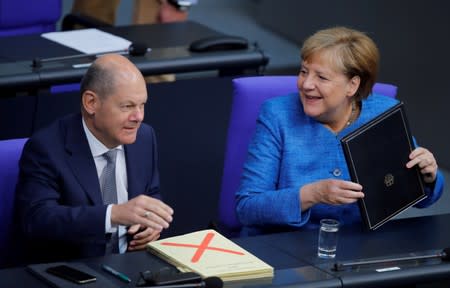German institutes slash growth forecasts, warn of downside risks
By Michael Nienaber
BERLIN (Reuters) - Germany's leading economic institutes on Wednesday slashed their growth forecasts for Europe's biggest economy for this year and next, blaming weaker global demand for manufacturing goods and increased business uncertainty linked to trade disputes.
The revisions, which feed into the government's own forecasts, reflect growing fears that a slowdown in Germany, driven by a recession in the export-dependent manufacturing sector, could hamper the broader euro zone economy.
The institutes also called on Chancellor Angela Merkel's right-left government to ditch its budget policy of incurring no new debt if the growth outlook deteriorates.
The powerful BDI industry association welcomed the institutes' push and urged a substantial public investment programme for education, climate protection and infrastructure.
But Economy Minister Peter Altmaier said there was no economic crisis and thus no need to give up the 'black zero' budget policy of avoiding new debt.
"I stick to my position that a debate about the 'black zero' now is the wrong subject at the wrong time," Altmaier said. The government should instead help companies by reducing taxes and contributions to the social security system, he added.
The institutes said they expect the German economy to grow by 0.5% this year and 1.1% in 2020. That compared with their April estimates of 0.8% and 1.8% respectively.
"An economic crisis with a pronounced underutilisation of the German economy is ... not in sight, although the cyclical downside risks are currently high," the institutes said, citing Britain's planned exit from the European Union as another risk.
For 2021, the institutes predict a mild recovery with economic expansion of 1.4%.
The government is due to publish its own growth forecasts on Oct. 17. In April, it predicted growth of 0.5% for 2019 and 1.5% for 2020.
"FUNDAMENTALLY WRONG"
The institutes said there was no reason to take additional fiscal action now, but that the government should use its fiscal leeway if the economic downturn turns out to be worse than expected.
"It would be fundamentally wrong to stick to the 'black zero' policy," said DIW economist Claus Michelsen, referring to the self-imposed goal of keeping a balanced budget.
Under the German debt brake rule, the federal government can take on new debt of up to 0.35% of economic output. That would be roughly 5 billion euros in 2020 after special factors such as growth and the outflow of earmarked money from special purpose funds have been taken into account.
The permitted debt would rise to 8.4 billion euros in 2021 and 9.7 billion euros in 2022, according to budget experts.
Merkel's centre-right party on Monday vowed to stick to its policy of no new debt, despite growing pressure at home and abroad for the government to borrow and invest.
"The decision to stick to the 'black zero' next year must not be a dogma," BDI Managing Director Joachim Lang said, adding that "old concepts" did not help in the face of the current economic challenges.
"A responsible fiscal policy must use the constitutionally allowed net new borrowing to launch overdue investments in education, climate protection and infrastructure," Lang said.
Finance Minister Olaf Scholz said on Wednesday that Germany would be able to cope with an economic crisis but added that he did not expect a downturn to be as bad as it was in 2008/2009.
"We are well prepared because we have decent financial resources so if there is an economic crisis, we can take countermeasures but at the moment we're only seeing slower growth," Scholz told public broadcaster ARD.
(Reporting by Michael Nienaber; Editing by Catherine Evans)









